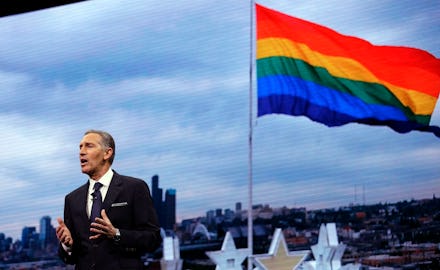Fathers and adoptive parents who work at Starbucks deserve equal leave when they bring home children

A big reason why I went to work for Starbucks seven years ago was because of their inclusiveness of the LGBTQ communities. I am a transgender man, and Starbucks is a place that I — and my LGBTQ friends who also work for the company — can be ourselves. As a member of the LGBTQ community, working for a company that has made a public commitment to non-traditional families has always made me proud to be a part of their team.
That’s why I was so surprised to learn that the paid leave offered to partners (the moniker for store employees) does not extend to fathers or adoptive parents. Currently, only biological mothers who work in your local Starbucks are offered paid leave after the births of their children.
As one of the only developed countries in the world without a national paid family leave program, the vast majority of Americans have no paid leave guaranteed by the federal government and have to depend on their employers for it. The long-term solution to this crisis is, of course, a federally mandated paid family leave insurance program for everyone in the U.S. But, in the absence of such federal policy, it’s time for companies like Starbucks that say they support the principles of diversity, equity and inclusion to move beyond discriminatory practices and show that they value all parents.
In January, Starbucks got a lot of positive press when they announced a new parental leave policy, but a closer look revealed that corporate moms were going to get three times more paid leave than barista moms — and dads and adoptive parents who work in the stores would get no leave at all. This leaves a large community of Starbucks employees, including the LGBTQ ones, in tough situations in which they might have to take unpaid leave if they want to care for their growing families.
Most Fortune 500 companies like Starbucks now pride themselves on offering equal benefits to their LGBTQ employees and have changed many of their policies to be more inclusive. But since LGBTQ people are four times more likely to be adoptive parents, and thus more likely than average to be dual-father households, unequal paid family leave remains one striking area in which major companies are leaving out these employees.
Unequal parental leave policies are still shockingly common in corporate America: A recent survey by Paid Leave for the United States found that a majority of the country’s top companies give little or no leave to fathers and adoptive parents.
The families that get the least amount of paid leave may also be the ones that need it the most. According to the National Center on Adoption and Permanency, studies suggest that lesbians and gay men may be more likely than heterosexual adults to adopt older children and those with special needs — children who often require more care as they adapt to their new environment. Offering less paid parental leave to dads and adoptive parents leaves these parents and children, without enough time to bond and set them up for a lifetime of success.
Lack of paid leave creates real financial hardship for LGBTQ families. Single LGBTQ adults raising children are three times more likely than comparable non-LGBTQ individuals to report household incomes near the poverty threshold, and married or partnered LGBTQ individuals living in two-adult households with children are twice as likely as comparable non-LGBTQ individuals to report household incomes near the poverty threshold.
At the Starbucks shareholders meeting in March, our new CEO Kevin Johnson said they “are always taking feedback from partners” to make sure their benefits and policies are in line with what is important to us. So, in June, a fellow in-store partner and I had a meeting with the vice president of global benefits, Ron Crawford, at Starbucks headquarters to talk about how they could fix their parental leave policies so it doesn’t exclude LGBTQ partners like us. When we arrived at the building, we were greeted by a giant rainbow flag flying over the entrance.
After we’d explained our position, Crawford repeated Johnson’s sentiment, and said he wanted to hear from more partners about why this is important to them — and I hope he will.
Since I started my campaign, I have been overwhelmed by the response from my fellow baristas: People from across the country, whom I have never met, have been cheering me on — someone even sent flowers to my store in LA! — and sharing their own experiences about how hard it was to leave their babies when they were so young, and how badly they want everyone to have the same opportunity to care for their families as straight mothers do.
Love is love is love. And family is family. Hopefully, Starbucks will recognize that partners’ families all need the same love, regardless of the parents’ gender.